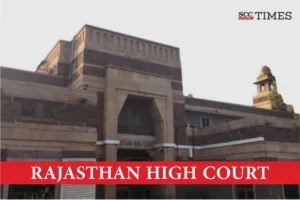Rajasthan High Court: In an appeal challenging the dismissal of applications seeking injunctions to prevent demolishing of alleged dwelling houses on disputed land by the Gram Panchayat, a single-judge bench of Rekha Borana, J., rejected the appellants’ claims of residential possession, malicious intent by the Gram Panchayat, and procedural lapses and dismissed the appeals. The Court imposed a cost of ₹ 50,000/- on the counsel and reiterated the ethical obligations of advocates and warned against misuse of judicial resources.
In the instant matter, the appellants filed appeals challenging the rejection of their applications under Order 39 Rules 1 and 2 read with Section 151 of the Civil Procedure Code, 1908 (CPC) by the Additional District Judge, Nagaur. The applications were related to seeking injunctions to prevent Gram Panchayat from demolishing their alleged dwelling houses on disputed land, which the appellants claimed to have possessed for over 40 years.
The trial court rejected the applications based on lack of evidence to prove applications for regularization. The trial court noted that the Tehsildar’s report dated 18-04-2023 indicated that there is no residential use of the land and only commercial activities were conducted on it. Evidence showed that the appellants owned and resided on other lands. It was also noted that there exists no proof to claim 40 years of residential use.
The Court noted that the applications for regularization were dated June 2024, while the impugned order was from March 2024, thereby confirming no such documents existed and presented before the trial court. The Court observed that the appellant’s applications lacked specifics, including land details, rendering them vague.
The Court noted that evidence and photographs revealed that the disputed land was used for commercial activities, which is supported by electricity bills and Tehsildar’s report. The Court noted that the appellants owned and resided on other lands with constructed houses. Therefore, the Court rejected the appellants claim that they had no alternative land.
The Court noted that the appellants had filed writ petitions and appeals, losing at every stage. It was noted that a prior order dated 21-01-2025, directed police assistance for the Gram Panchayat to remove encroachments, contradicting appellants’ claims.
The Court noted that the counsel made false and misleading submissions, including unsubstantiated urgency claims and existence of regularisation applications before the trial court. It was further noted that the appellants intentionally delayed proceedings despite filing the appeals in May 2024.
“This Court is of the clear view that had the facts not been brought to the notice of this Court by the counsel appearing for the Gram Panchayat, definitely the appellants would have had a leverage by getting away with concealment and non-disclosure of the material facts. The distorted facts as stated before this Court not only prove to be an attempt to mislead the Court but also an attempt to waste precious time of the Court.”
The Court strongly criticized the conduct of the appellants’ counsel for presenting misleading arguments and withholding material facts, thereby attempting to mislead the Court and reiterated that “It is the basic obligation of the litigant and his lawyer not to deceive or mislead the Court. This responsibility extends to every function including the presentation and interpretation of facts, drafting of pleadings and documents, legal argument and other submissions or communications with the Court.”
“The duty not to intentionally mislead or deceive is only the bare minimum required of the advocate and solicitor. As an officer of the Court, he is expected to advance the public interest in the fair administration of justice even if this could jeopardise his client’s interests. Hence, he is not only required to inform the Court of all relevant decisions and legislative provisions of which he is aware but also bound not to make any statements which are inaccurate, untrue and misleading.”
The Court held that the Gram Panchayat followed due process and targeted all encroachments without discrimination, as evidenced by a Public Land Protection Cell (PLPC) report. The Court further held that the trial court’s findings are consistent with evidence and law and the appellants, and their counsel acted deceitfully, thereby abusing the legal process.
The Court dismissed the appeals with a cost of ₹ 50,000/- on the counsel, to be deposited with the Litigants’ Welfare Fund within a period of 15 days, for “an attempt to get a priority in getting the matters listed out of turn on account of the alleged grave urgency and further to mislead the Court by total incorrect, false and misconceived submissions.”
[Hussain v. Gram Panchayat Roon, 2025 SCC OnLine Raj 271, Decided on 06-02-2025]
Advocates who appeared in this case :
Mr. C.S. Kotwani assisted by Mr. Mukesh Purohit & Mr. Gaurav Khatri, Counsel for the Petitioners
Mr. Manish Tak with Mr. Dilip Solanki, Counsel for the Respondent

